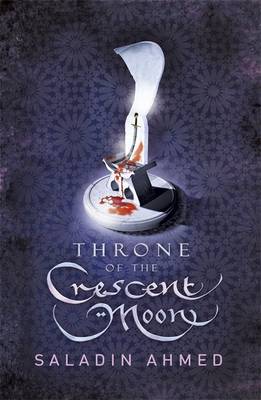Reviewed by sa090 on
I feel like I somewhat went into this expecting a different kind of story, but it’s surely not a bad one.
───────────────────
Was hoping to get this one out yesterday, but no matter :)
I find middle eastern inspired stories to be extremely fascinating, however, not all of them end up being extremely rewarding to read. Now Throne of the Crescent Moon follows a more action oriented plot line with a mystery surrounding it before it gets wrapped up, the journey in doing all of this was longer than I expected it to be and would’ve probably been boring to follow, if the characters weren’t interesting for me to care. Thankfully, I didn’t have to suffer through this book in that regard. Every single character of them was entertaining or fascinating to watch in their own way, either through their occupation, their way of speech, their purpose in the story or the abilities they were blessed with.
Now I do believe that this is very loosely based on said middle eastern mythology since it deals with Djinn and Ghouls, but the heavy reliance on religion makes me think that the before mentioned is where the similarities end when taking in the added culture. I could be wrong of course, but certain passages and dialogues didn’t strike me as something a real middle eastern devotee would be saying when taking in religion as a companionable point. Furthermore, I honestly didn’t expect the book to be so heavy on the religious aspects or views of the people in Dhamswaat. Was it off-putting? Somewhat at first, but I think I got to a point where I didn’t care all that much about it later on.
The book also deals with some issues in regards to races, corruption and power struggles which made it interesting in its own way, but the thing that pulled it all together were the characters and what each was required to do in the end. The book doesn’t really lack much, but I feel like the story had very basic elements throughout of its structure that made it seem good, but not good enough that I would be blown away. Characters can only do so much with a somewhat weaker foundation.
The only real bit of criticism I would have here is the romance between the young ones, or rather how Zamia thinks in regards to relationships and marriage. There is something so incredibly weird about her way of thinking that it makes it really strange to think that a girl who lived in a Bedouin society with her very specific tasks would ever have, I could see a reason for said way of thinking if Zamia was raised differently, but with what I can see and have read about her situation it’s not as “accurate” as I believe it could’ve been. But it might be my own way of thinking in that one and the lack of knowledge on how this particular group works in Saladin Ahmed’s world.
Speaking of world, I do hope that we get a bigger look on the cultures at some point whenever the sequel of this book gets published. We met different ones this time around for sure, but I want a much deeper look on how it will expand from here. I’m definitely interested to see where some characters will end with the decisions they made in this book, and if my information about the sequel is correct, I don’t think I’ll wait long.
Final rating: 3/5
Reading updates
- Started reading
- 13 November, 2018: Finished reading
- 13 November, 2018: Reviewed
